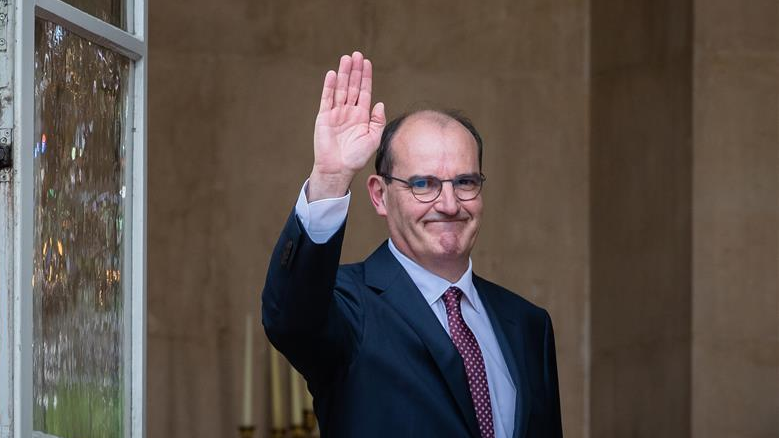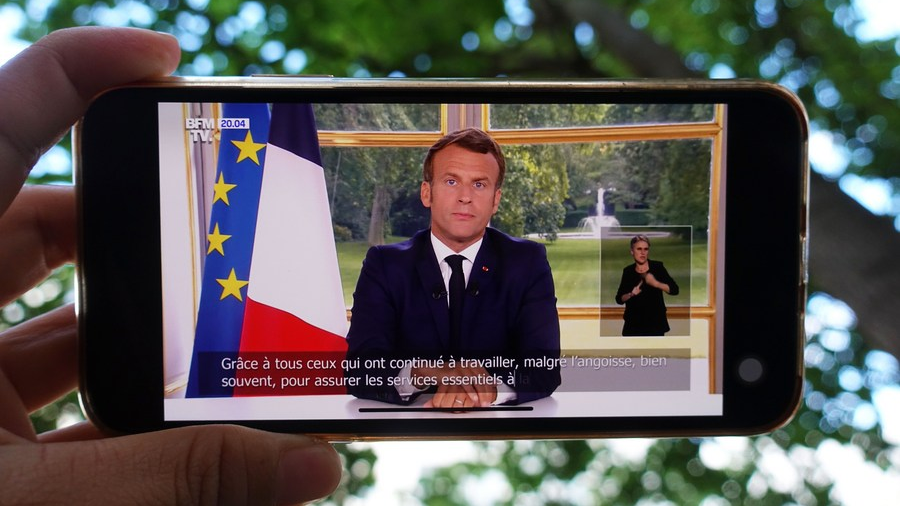
The newly-appointed French Prime Minister Jean Castex waves at the handover ceremony in the courtyard of the Hotel Matignon in Paris, France, on July 3, 2020. /Xinhua
The newly-appointed French Prime Minister Jean Castex waves at the handover ceremony in the courtyard of the Hotel Matignon in Paris, France, on July 3, 2020. /Xinhua
Editor's note: Freddie Reidy is a freelance writer based in London. He studied history and history of art at the University of Kent, Canterbury, specializing in Russian history and international politics. The article reflects the author's opinions, and not necessarily the views of CGTN.
On July 3, French President Emmanuel Macron appointed a new prime minister, Jean Castex, to lead the French government. The practice of appointing a new prime minister within a presidential term or "quinquennat (five-year term)" is not uncommon but reveals much of a president's ambition and direction ahead of re-election. What does the appointment of the low profile Castex tell us at a critical time for France?
Ever since the late two-time prime minister, president and titan of French politics, Jacques Chirac retired in 2007, residents of the Elysees Palace have struggled with nose-diving popularity.
Chirac's successor Nicolas Sarkozy saw record-low approval ratings, only to be outdone by his successor Francoise Hollande who declined to even run for a second term. Emmanuel Macron has followed in this undesirable tradition. France has struggled with a fragile economy, long-running employment disputes, and wider social unrest.
While Macron's initial popularity was short-lived, his first prime minister, Édouard Philippe, had not suffered the same fate. A recent poll found that Philippe's approval rating was 49 percent, 10 percent higher than that of the president's. Perhaps forming part of the president's desire to replace him.
Prior to the outbreak of the pandemic, President Macron had been battling a variety of domestic issues. Economic reform has been slow and painful, giving rise to the Gilet Jaunes (Yellow Vests) movement and widespread strikes. The COVID-19 crisis has exacerbated this, as France's industries suffer.
The automotive industry has already required a sizeable bailout as has the nation's flag carrier, Air France. According to government forecasts, the economy will contract by 11 percent this year.
It is also widely felt that Macron's imperialist style has fuelled a feeling that the government is disconnected from the needs of the people. The former investment banker has not shied from using France's grandest arenas such as the Palace of Versailles, for political speeches, or comparing himself to Charles de Gaulle. Such stunts have played out poorly with the electorate and impeded cross-party dialogue.

French President Emmanuel Macron is pictured during a televised address to the nation in Paris, France, June 14, 2020. /Xinhua
French President Emmanuel Macron is pictured during a televised address to the nation in Paris, France, June 14, 2020. /Xinhua
While the incoming Castex attended the same university as the president and is very much a part of France's political machine, he cultivates a more down to earth image. Shunning the affluent Parisian suburbs for weekends, instead, returning to the rural Pyrenean commune of Prades, where he serves as Mayor. His humbler approach may help to open a dialogue with political opponents and alleviate the concerns of those who believe the president is aloof and out of touch.
With such a reputation, Macron had lost ground in recent local elections to both the Green and Socialist parties, part of the rationale for a change of prime minister.
Castex's appointment does not, however, reflect a ceding ground to either wing. As with his predecessor, Castex is a refugee of the Republicans center-right party, previously serving as deputy chief of staff to Nicolas Sarkozy. Concessions do seem to have been made in Castex's anticipated appointment of Nicolas Ravel as chief of staff, Ravel, having served in the socialist government of Francoise Hollande.
While economic and political challenges remain for Macron, as well as a strained relationship with Chancellor Merkel, Macron's decision to appoint a new prime minister arguably helps to insulate him against the ill effects of the COVID-19 pandemic.
One of the features of France's Fifth Republic, is that prime ministers act as "shock absorbers" to the president. Édouard Philippe and Emmanuel Macron had enjoyed a superb working relationship, however, in Macron's own words, the upcoming months are "looking very tough". On leaving office, the Law Court of the Republic declared that it was launching a probe into the former prime minister and two health ministers' handling of the pandemic.
With Philippe's departure, Macron is now protected, in part, from the findings of the inquiry. Jean Castex had already been placed in charge of France's recovery operation ahead of his appointment. Therefore, it is Castex's political responsibility, and Macron can effectively use the new prime minister to insulate himself from potential bumps in the road, as France emerges from the grips of COVID-19.
Whether Castex's appointment will help to appease the voters' desire for change remains to be seen. The president's En Marche party failed to win a single major city in last week's election, and for all the rhetoric of "reinvention" and a "new path", this new appointment would appear more a case of political expediency, than an intent to change course.
(If you want to contribute and have specific expertise, please contact us at opinions@cgtn.com.)